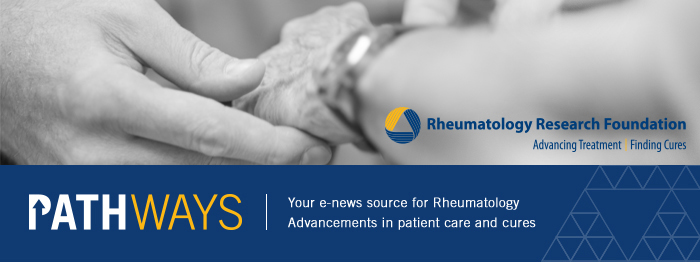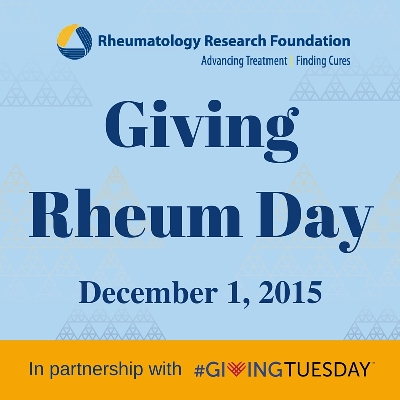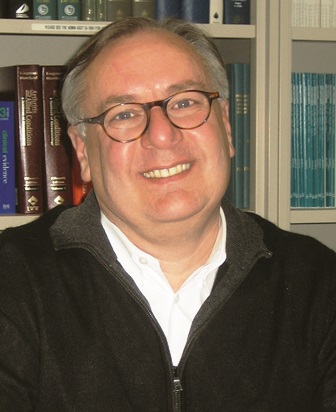Pathways

Volume 4 • Issue 11 • November 2015 • Rheumatology Research Foundation
Support Advancements in Patient Care
On December 1, the Rheumatology Research Foundation will host #GivingRheumDay. Held in conjunction with the international #GivingTuesday movement, #GivingRheumDay will bring awareness for the 11 million Americans living with rheumatic disease and the Foundation’s ongoing efforts to improve their health. #GivingRheumDay contributions will support the Foundation’s five-year, $60 million Journey to Cure campaign, which funds research and training to advance treatments and improve patient care.
Those interested in joining the #GivingRheumDay movement may consider the following options:
- Bookmark the Foundation’s AmazonSmile account for online holiday shopping. Amazon will donate 0.5% of the purchase price to the Rheumatology Research Foundation.
- Follow the Foundation on Facebook and Twitter. Help spread the word about #GivingRheumDay by sharing posts with friends and family.
- Take a picture that depicts the importance of giving, and share it on social media using #UnSelfie and #GivingRheumDay.
- Make a #GivingRheumDay donation at www.rheumresearch.org/GivingRheumDay.
On #GivingRheumDay, the Foundation’s social media accounts will feature some of the donors who have helped the organization raise more than $55.3 million as part of the Journey to Cure campaign. With about six months left in the campaign, the Foundation has reached 92 percent of the $60 million goal. Foundation leaders attribute the success to a variety of supporters including rheumatology community members, corporate donors, and patients and their loved ones.
“This spectacular milestone would not have been possible if it weren’t for the support of our generous donors,” Rheumatology Research Foundation President Eric Matteson, MD, MPH, says. “Those affected by rheumatic disease, as well as companies and members of the rheumatology community, have really pulled together to support the Foundation’s mission to advance research and training to improve the health of people with rheumatic diseases. I commend them for their commitment and dedication.”
 |
Since the Journey to Cure campaign was launched in 2011, the Foundation has pledged that every dollar earned would be directly invested into the Foundation’s extensive awards and grants program. The program has committed more than $131 million and funded more than 2,600 individual awards since its inception in 1985. Understanding how important these awards and grants are to recruiting and training the next generation of rheumatology experts, the rheumatology community provides a broad-base of support that allows the Foundation to continue its mission. Erin Arnold, MD, rheumatologist at Orthpaedics and Rheumatology of the North Shore in Skokie, Illinois, says, “The Foundation's efforts provide hope for our patients. Supporting the Foundation sends the message to patients that rheumatologists are their partners, committed to advancing the field and ultimately finding a cure. This is very powerful."
Patients and their loved ones are also making significant commitments to Journey to Cure. Steve and Debbie Russell, whose daughter was diagnosed with juvenile idiopathic arthritis at the age of 16, say that they support the Foundation because of its effort to address the shortage of rheumatologists. Currently, there are more than 240,000 children for every one board certified pediatric rheumatologist in the United States.
“As parents of a child impacted by rheumatic disease, we are very fortunate and so thankful to all of the caring and dedicated people working toward improving patient care. We felt a calling and responsibility to support an organization that seeks to meet the unprecedented demand for patient care today, while ensuring a pipeline of qualified rheumatology health providers for tomorrow,” says Steve Russell.
This year marks the 30th anniversary of the Rheumatology Research Foundation! To celebrate 30 years of advancing treatment of rheumatic diseases, the Foundation will profile 30 people who have made a significant impact in the world of rheumatology through their work with the Foundation. Please feel free to email us if you would like to contribute a story about how the work of the Foundation has directly impacted your life, or if you would love an opportunity to share your story or brag about your rheumatologist. We would love to hear from you!
30 Over 30: Ed Yelin, PhD

Ed Yelin, PhD |
Ed Yelin, PhD, joined the University of California, San Francisco faculty in 1980 after his mentor, a first generation rheumatologist, recruited him. Since joining the staff, Dr. Yelin has been involved in numerous studies that focus on health policy issues related to chronic disease, including the impact of changes in the healthcare system on arthritis patients and economic and social impacts of chronic disease and disability.
Dr. Yelin has been lucky to receive government funding for many of his projects, but as he’s explored highly innovative research or more risky projects, he’s learned it’s harder to count on government dollars. “The role of the Foundation is essential for fellows and junior faculty and also senior faculty, like me,” said Dr. Yelin. “The Foundation plays a critical role in our careers by funding innovative research that would be difficult to get funding elsewhere. The Foundation is willing to push the envelope with research projects that may be risky but also have great potential to help our patients and are essential to advancing the field.”
Looking forward to the next 30 years, Dr. Yelin hopes the Foundation continues to grow its support of innovative work from all career levels so that the field of rheumatology can progress as well. “By funding the junior investigators through various awards, we provide an opportunity for mentees to make the transition from fellow to junior faculty and beyond,” said Dr. Yelin. “It’s important for us to pay back those that invested in us to continue the investment in the field.”